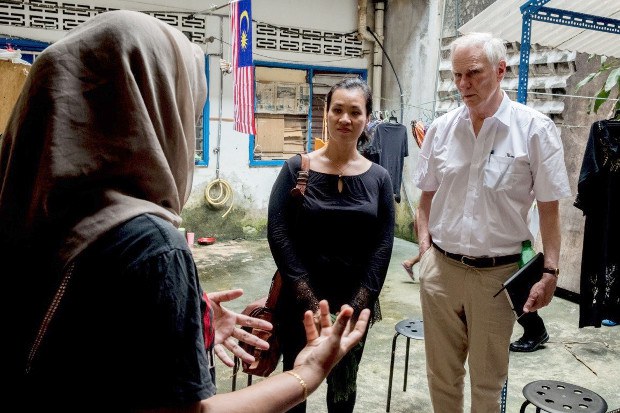UN Rapporteur Rebukes Malaysian Reversal on Poverty Reporting
2020.07.06
Washington
 U.N. Special Rapporteur Philip Alston (right) speaks to low-income families in Kuala Lumpur during his 11-day visit to Malaysia, Aug. 23, 2019
U.N. Special Rapporteur Philip Alston (right) speaks to low-income families in Kuala Lumpur during his 11-day visit to Malaysia, Aug. 23, 2019
A move by Malaysia’s new government to drop the previous administration’s pledge to correct “misleadingly low” assessments of poverty is worrisome because it will make eradication efforts more difficult in the Southeast Asian country, a United Nations expert said Monday.
Philip Alston, the outgoing U.N. special rapporteur on extreme poverty and human rights, expressed his concerns while releasing his final report about poverty in Malaysia that stemmed from his visit to the country last year.
“Malaysia’s new government has performed a backflip on its predecessors’ commitment to take poverty seriously,” Alston said in a statement issued from New York on Monday. “The government’s reversal is deeply concerning because the current [poverty] line is inadequate and almost universally considered to be misleadingly low.
His successor in the role of U.N. rapporteur, Olivier De Schutter, is expected to present Alston’s report on Malaysia to the United Nations Human Rights Council on Tuesday.
“Key poverty-related data is often inaccessible or even non-existent, which is counterproductive and leaves policymakers and researchers essentially working in the dark. Unlike many comparable countries, Malaysia does not provide full access to household survey microdata, and does not collect information on the size of certain vulnerable populations,” Alston said.
The offices of Prime Minister Muhyiddin Yassin and Mohamed Azmin Ali, the international trade and industry minister, did not immediately respond Monday to requests for comment from BenarNews. Azmin Ali’s ministry is responsible for poverty issues in Malaysia.
‘A smokescreen’
Following his 11-day visit to Malaysia in August 2019, Alston challenged the then-government’s claims that the poverty rate was 0.4 percent – saying it could be as much as 20 percent, based on independent analysis.
With its population of 31.5 million people, a poverty rate of 0.4 percent would represent 126,000 people, while a rate of 20 percent would represent 6.3 million.
On Monday, Alston said the national poverty line of 980 ringgit (U.S. $230) per household per month would see an urban family of four surviving on 8 ringgit (less than $2), per person per day.
“The insistence that the line is ‘derived from internationally accepted standards’ is a smokescreen and ignores the blatant mismatch between reality and statistics. Pretending that almost no one in the entire country lives in poverty doesn’t change the reality that millions are poor,” Alston said. “Saving face is one thing, but distorting the facts is quite another.”
Alston’s final report, dated April 6, said then-Prime Minister Mahathir Mohamad had promised last August to study the poverty claims, adding that his administration had made good on that promise.
“Although the Minister of Economic Affairs [Mohamed Azmin Ali] initially defended the poverty line, then-Prime Minister Mahathir Mohamad and his economic adviser acknowledged that the poverty measure should be adjusted, while the president of the People’s Justice Party, Anwar Ibrahim, called the current poverty rate ‘inaccurate’ and said the special rapporteur’s findings were ‘only shocking to those who have a clear disconnect.’
“In October, the prime minister said that the government was ready to review the poverty line ‘to provide a true picture of poverty in Malaysia’ and in December, the Ministry of Federal Territories announced it would formulate an urban poverty eradication master plan for Kuala Lumpur, including a redefinition of urban poverty,” the report said, adding, “That consensus makes the new government’s response all the more shocking.”
Muhyiddin takes power
Muhyiddin was sworn in as prime minister in March after Mahathir stepped down because his Pakatan Harapan coalition government began to crumble. The new prime minister had been a deputy in the Mahathir-led Bersatu party, but formed a new coalition to take control of the government.
Alston’s statement praised Malaysia for progress against poverty over the past four decades.
“[B]ut its continued use of an outdated and unrealistic poverty line obscures the troubling reality that millions scrape by on very low incomes, a situation only made worse by COVID-19,” he said.
“COVID-19 has demonstrated that anyone can lose a job through no fault of their own, and reinforced the absolute necessity of strong support programs.”
The former special rapporteur also said Muhyiddin’s government must change before it could bring relief to the nation’s poor people.
“Overall, while Malaysia has achieved progress against poverty, unless the new government takes a different approach, the job will remain painfully incomplete,” Alston said.
“The government has a real opportunity to become a true champion of poverty reduction by improving the lives of many facing hardship, providing those in poverty with the support they need and ensuring that the country’s economic growth is truly inclusive and benefits the entire population.”







